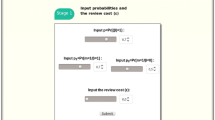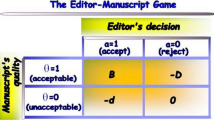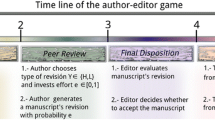Abstract
In this paper, the interaction of the reviewers is analyzed in the context of the open peer review. There, the reviewer group can exchange comments on the manuscript. This group of experts is called the informed reviewer group because, with the exchange of comments, each reviewer knows about the trends in the evaluation of the manuscript. Then, we show that, in a Bayesian Nash equilibrium, the probability that the editor chooses to accept or reject is the same. In this paper, this reviewer group is also compared to a group of uninformed reviewers in the classic review system. In this second case, the uninformed reviewers only communicate with the journal editor. They always believe that their recommendation is in the majority, and the probability that the uninformed reviewers abstain from making any recommendation increases as the number of reviewers grows. In some open access journals, the editor can obtain recommendations by both uninformed and informed reviewers groups. In this situation, the editor’s decision could depend on the order followed by the editor in the analysis of the recommendations of each reviewers group (informed and uninformed). A free online tool has been created to help the editor with this process.





Similar content being viewed by others
References
Armstrong, J. S. (1982). Barriers to scientific contributions: The authors formula. Behavioral and Brain Sciences, 5(02), 197–199.
Bornmann, L. (2008). Scientific peer review. An analysis of the peer review process from the perspective of sociology of science theories. Human Architecture-Journal of the Sociology of Self-Knowledge, 6(2), 23–38.
Bornmann, L. (2012). The Hawthorne effect in journal peer review. Scientometrics, 91, 857–862. https://doi.org/10.1007/s11192-011-0547-y.
Bornmann, L. (2014). Book Review: Gould, T.H.P. (2013). Do we still need peer review? An argument for change. Scarecrow Press: Plymouth, UK. Journal of the American Society for Information Science and Technology, 65(1), 209–213.
Brown, R. J. C. (2004). The use of double anonymity in peer review: A decision whose time has come? Quality Assurance, 11, 103–109.
Bruza, P. D., Wang, Z., & Busemeyer, J. R. (2015). Quantum cognition: A new theoretical approach to psychology. Trends in Cognitive Science, 19(7), 383–393.
Garcia, J. A., Rodriguez-Sanchez, R., & Fdez-Valdivia, J. (2014). The principal-agent problem in peer review. Journal of the Association for Information Science and Technology, 66(2), 297–308. https://doi.org/10.1002/asi.23169.
Garcia, J. A., Rodriguez-Sanchez, R., & Fdez-Valdivia, J. (2015). Adverse selection of reviewers. Journal of the Association For Information Science and Technology, 66(6), 1252–1262. https://doi.org/10.1002/asi.23249.
Garcia, J. A., Rodriguez-Sanchez, R., & Fdez-Valdivia, J. (2016). Why the referees’ reports I receive as an editor are so much better than the reports I receive as an author? Scientometrics, 106(3), 967–986. https://doi.org/10.1007/s11192-015-1827-8.
Garcia, J. A., Rodriguez-Sanchez, R., & Fdez-Valdivia, J. (2017). Problems with open participation in peer review. Scientometrics, 112(3), 1881–1885. https://doi.org/10.1007/s11192-017-2445-4.
Lee, C. J., Sugimoto, C. R., Zhang, G., & Cronin, B. (2013). Bias in peer review. Journal of the American Society for Information Science and Technology, 64(1), 2–17.
Ross-Hellauer, T. (2017). What is open peer review? A systematic review. F1000Research, 6, 588. https://doi.org/10.12688/f1000research.11369.1.
Taylor, C. R., & Yildirim, H. (2010). Public information and electoral bias. Games and Economic Behavior, 68, 353–375.
Acknowledgements
This research was sponsored by the Spanish Board for Science, Technology, and Innovation under Grant TIN2017-85542-P, and co-financed with European FEDER funds. Sincere thanks are due to the reviewers for their constructive suggestions.
Author information
Authors and Affiliations
Corresponding author
Rights and permissions
About this article
Cite this article
Rodriguez-Sánchez, R., García, J.A. & Fdez-Valdivia, J. Editorial decisions with informed and uninformed reviewers. Scientometrics 117, 25–43 (2018). https://doi.org/10.1007/s11192-018-2875-7
Received:
Published:
Issue Date:
DOI: https://doi.org/10.1007/s11192-018-2875-7




